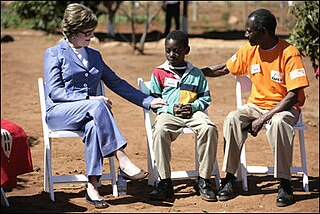
The First Amendment to the United States Constitution prevents the government from making laws that regulate an establishment of religion, or that prohibit the free exercise of religion, or abridge the freedom of speech, the freedom of the press, the freedom of assembly, or the right to petition the government for redress of grievances. It was adopted on December 15, 1791, as one of the ten amendments that constitute the Bill of Rights.

Sexual abstinence or sexual restraint is the practice of refraining from some or all aspects of sexual activity for medical, psychological, legal, social, philosophical, moral, religious or other reasons. Sexual abstinence is distinct from asexuality, which is a sexual orientation where people feel little or no sexual attraction. Celibacy is sexual abstinence generally motivated by factors such as an individual's personal or religious beliefs. Sexual abstinence before marriage is required in some societies by social norms, or by law in some countries. It is a part of chastity.
Abington School District v. Schempp, 374 U.S. 203 (1963), was a United States Supreme Court case in which the Court decided 8–1 in favor of the respondent, Edward Schempp, on behalf of his son Ellery Schempp, and declared that school-sponsored Bible reading and the recitation of the Lord's Prayer in public schools in the United States was unconstitutional.

The Religious Freedom Restoration Act of 1993, Pub. L. No. 103-141, 107 Stat. 1488, codified at 42 U.S.C. § 2000bb through 42 U.S.C. § 2000bb-4, is a 1993 United States federal law that "ensures that interests in religious freedom are protected." The bill was introduced by Congressman Chuck Schumer (D-NY) on March 11, 1993. A companion bill was introduced in the Senate by Ted Kennedy (D-MA) the same day. A unanimous U.S. House and a nearly unanimous U.S. Senate—three senators voted against passage—passed the bill, and President Bill Clinton signed it into law.

Reynolds v. United States, 98 U.S. 145 (1878), was a Supreme Court of the United States case that held that religious duty was not a defense to a criminal indictment. Reynolds was the first Supreme Court opinion to address the First Amendment's protection of religious liberties, impartial juries and the Confrontation Clauses of the Sixth Amendment.
In United States law, the Establishment Clause of the First Amendment to the United States Constitution, together with that Amendment's Free Exercise Clause, form the constitutional right of freedom of religion. The relevant constitutional text is:
Congress shall make no law respecting an establishment of religion...
Rust v. Sullivan, 500 U.S. 173 (1991), was a case in the United States Supreme Court that upheld Department of Health and Human Services regulations prohibiting employees in federally funded family-planning facilities from counseling a patient on abortion. The department had removed all family planning programs that involving abortions. Physicians and clinics challenged this decision within the Supreme Court, arguing that the First Amendment was violated due to the implementation of this new policy. The Supreme Court, by a 5–4 verdict, allowed the regulation to go into effect, holding that the regulation was a reasonable interpretation of the Public Health Service Act, and that the First Amendment is not violated when the government merely chooses to "fund one activity to the exclusion of another."
Bowen v. Roy, 476 U.S. 693 (1986), was a United States Supreme Court case which established limits on freedom of religion in the United States.
South Dakota v. Dole, 483 U.S. 203 (1987), was a case in which the United States Supreme Court considered the limitations that the Constitution places on the authority of the United States Congress when Congress uses its authority to influence the individual states in areas of authority normally reserved to the states. The Court upheld the constitutionality of a federal statute that withheld federal funds from states whose legal drinking age did not conform to federal policy.
Cantwell v. Connecticut, 310 U.S. 296 (1940), is a landmark court decision by the United States Supreme Court holding that the First Amendment's federal protection of religious free exercise incorporates via the Due Process Clause of the Fourteenth Amendment and so applies to state governments too.

Abstinence-only sex education is a form of sex education that teaches not having sex outside of marriage. It often excludes other types of sexual and reproductive health education, such as birth control and safe sex. Comprehensive sex education, by contrast, covers the use of birth control and sexual abstinence.
Hein v. Freedom From Religion Foundation, 551 U.S. 587 (2007), was a decision by the United States Supreme Court which ruled that taxpayers do not have the right to challenge the constitutionality of expenditures by the executive branch of the government. The issue was whether taxpayers have the right to challenge the existence of the White House Office of Faith-Based and Community Initiatives. The case centered on three Supreme Court precedents: Flast v. Cohen, Bowen v. Kendrick, and Valley Forge Christian College v. Americans United for Separation of Church & State.
Harris v. McRae, 448 U.S. 297 (1980), was a case in which the Supreme Court of the United States held that states participating in Medicaid are not required to fund medically necessary abortions for which federal reimbursement was unavailable as a result of the Hyde Amendment, which restricted the use of federal funds for abortion. The Court also held that the funding restrictions of the Hyde Amendment did not violate the Fifth Amendment or the Establishment Clause of the First Amendment.
Tucker v. Texas, 326 U.S. 517 (1946), was a case in which the Supreme Court of the United States held that a state statute making it an offense to distribute literature in a federal government-owned town was an improper restriction on freedom of the press and religion.
This is a timeline of reproductive rights legislation, a chronological list of laws and legal decisions affecting human reproductive rights. Reproductive rights are a sub-set of human rights pertaining to issues of reproduction and reproductive health. These rights may include some or all of the following: the right to legal or safe abortion, the right to birth control, the right to access quality reproductive healthcare, and the right to education and access in order to make reproductive choices free from coercion, discrimination, and violence. Reproductive rights may also include the right to receive education about contraception and sexually transmitted infections, and freedom from coerced sterilization, abortion, and contraception, and protection from practices such as female genital mutilation (FGM).
The Office of Population Affairs (OPA) is part of the Office of Public Health and Science in the United States Department of Health and Human Services (HHS). It is responsible for reproductive health topics, including adolescent pregnancy, family planning, and sterilization, as well as other population issues.
In the United States, sex education is taught in two main forms: comprehensive sex education and abstinence-only as part of the Adolescent Family Life Act, or AFLA. Comprehensive sex education is also called abstinence-based, abstinence-plus, abstinence-plus-risk-reduction, and sexual risk reduction sex education. This approach covers abstinence as a choice option, but also informs adolescents about human sexuality, age of consent and the availability of contraception and techniques to avoid contraction of sexually transmitted infections. Every state within the U.S. has a mandated AIDS Education Program.
Legal Services Corp. v. Velazquez, 531 U.S. 533 (2001), is a decision of the Supreme Court of the United States concerning the constitutionality of funding restrictions imposed by the United States Congress. At issue were restrictions on the Legal Services Corporation (LSC), a private, nonprofit corporation established by Congress. The restrictions prohibited LSC attorneys from representing clients attempting to amend existing welfare law. The case was brought by Carmen Velazquez, whose LSC-funded attorneys sought to challenge existing welfare provisions since they believed that it was the only way to get Velazquez financial relief.

The Adolescent Family Life Act (AFLA) is a United States federal law enacted during the Reagan Administration as part of the Omnibus Budget Reconciliation Act of 1981. AFLA provided funding for a series of social programs aimed at promoting abstinence through reproductive health education.
Zubik v. Burwell, 578 U.S. ___ (2016), was a case before the United States Supreme Court on whether religious institutions other than churches should be exempt from the contraceptive mandate, a regulation adopted by the United States Department of Health and Human Services (HHS) under the Affordable Care Act (ACA) that requires non-church employers to cover certain contraceptives for their female employees. Churches are already exempt under those regulations. On May 16, 2016, the Supreme Court vacated the Court of Appeals ruling in Zubik v. Burwell and the six cases it had consolidated under that title and returned them to their respective courts of appeals for reconsideration.





